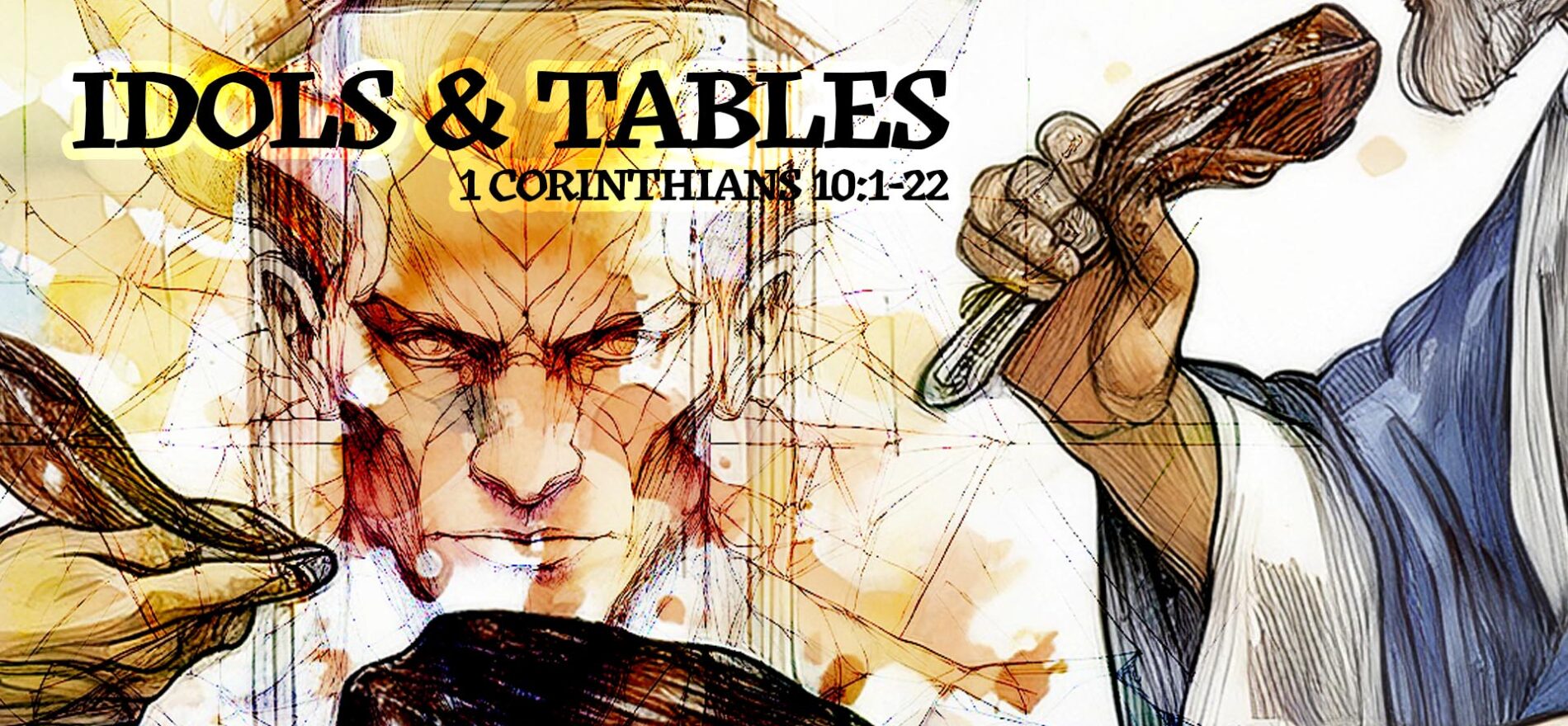[Transcript]
On the surface, it might seem like Paul changed direction. For two chapters, we’ve been reading about Paul’s teachings on Christian rights and how we should surrender them to serve and love others. Then, suddenly, he shifts to a warning against idolatry. Is this related to that? Consider this: what are we doing when we refuse to lay down our rights? We idolize them. We make idols—little gods—out of the way we believe we should be able to live. This warning against idolatry is squarely aimed at our desire to keep our rights.
“Now these things took place as examples for us, that we might not desire evil as they did.” 1 Corinthians 10:6
Chapter ten begins with a reflection on Israel’s wilderness wanderings. Paul reminded the Corinthians that their ancestors, the Jewish fathers, all experienced the same deliverance in the wilderness. They all passed through the sea, which served as their “baptism” into Moses (10:2). They all ate manna and drank water from rocks (10:3-4). And they were all receiving spiritual drink from the Rock, whom Paul revealed was Christ (10:4). Yet many of them were overthrown in the wilderness for their lack of faith (10:5). They grumbled against Moses, against the Lord, and the Lord swore in his wrath that they would not enter His rest.[1]
However, this was more than just a history lesson. Paul understood that what happened to them serves as a warning for us. He equated their evil desires with idolatry. To put it simply, they wanted things their way despite saying they would do things the Lord’s way. Wanting things your way instead of His is idolatry. Now, bring the analogy full circle: exercising our rights at the expense of another’s conscience is idolatry, and Paul strongly warns against it.
“We must not put Christ to the test, as some of them did and were destroyed by serpents, nor grumble, as some of them did and were destroyed by the Destroyer.” 1 Corinthians 10:9-10
I must confess that these verses have always presented a challenge to the way Jesus was taught to me in Sunday School. Is Paul saying that if I practice idolatry as Israel did, by insisting on my own rights at the expense of a weaker brother’s conscience – or in any way – that I risk being destroyed? Apparently the answer is “yes,” yet we don’t hear that kind of preaching very often. Paul wasn’t about to not warn Corinth about this. In fact, here in a little bit when we get to the end of chapter 11, we’ll deal with some of this temporal judgment, as some of the Corinthians had died because they abused the Lord’s supper.
I bring this up because many Christians are worshiping an idea of Jesus, and not the actual Jesus. I don’t want to be too sharp in my criticism because I’m not implying that they aren’t saved or anything like that. I mean, it’s possible that they aren’t saved. In that case, I would say they are intentionally rejecting the Jesus described in the Bible for a version that they feel is more palatable. But I’m mostly referring to believers who’ve been introduced to Jesus, believed the Gospel, but for whatever reasons they haven’t matured in their understanding of Him. It’s a sin of ignorance, not defiance. We must know whom we have believed in and live accordingly. In an age where the Bible is readily available, ignorance will never stand up as an excuse. Get to know your Lord and Savior, and adjust your perspective accordingly.
Therefore, we must view our sinful desires in the proper light. When we insist on our rights and exercise them at the expense of a weaker brother, we become idolaters. We cannot claim to be under grace as an excuse for our choices because our actions are not gracious toward the one whose faith is being destroyed (8:11). It is in this context that we are warned that when we think we are standing, we must watch out lest we fall (10:12). Also, in this context, we are reminded that no temptation is too strong to resist because the Lord will provide a way out so we can endure it (10:13).
“No, I imply that what pagans sacrifice they offer to demons and not to God. I do not want you to be participants with demons.” 1 Corinthians 10:20
In verse fourteen, Paul returned the focus to the topic that initiated this entire discussion: eating meat from pagan temples. “Flee from idolatry.” His call to flee is based on a core idea that he will explain more in chapter twelve. We are the Body of Christ. We share the same cup, eat the same bread. We are one body, and each person is a member of that body. Therefore, what you do affects your neighbor, and vice versa, because we are one.
Within the Corinthian church, the issue wasn’t just about buying meat at the market that had been offered in pagan temples. The real problem was that to acquire that meat, one had to participate in the activities at the pagan temple. This is clear from Paul’s comparison to the people of Israel.
“Observe Israel after the flesh: Are not those who eat of the sacrifices partakers of the altar?” 1 Corinthians 10:18 (NKJV)
The only people allowed to eat the sacrifices were those involved in offering them. This highlights the core of the offense regarding weaker brothers in chapter eight. It wasn’t the meat itself, but how they accessed it. However, Paul goes further. Even if they are correct, and these so-called “gods” aren’t really God (8:4-5), there are demons behind their worship. Participating in their sacrifices, even in unbelief, is eating at the table of demons. This should never be the case for any believer.
“You cannot drink the cup of the Lord and the cup of demons. You cannot partake of the table of the Lord and the table of demons.” 1 Corinthians 10:21
I can think of multitudes of ways this principle might apply to our lives. When you begin deep-diving into the darkness that’s behind everything in media, politics, sports, and yes, religion, what’s left for us to do? Should we withdraw from everything? Should we do as the Amish have done and seclude ourselves into tight communities that engage with the world as little as possible? I don’t think so. Paul was addressing an egregious violation of worship. Believers should move into the world and not retreat, for the earth is the Lord’s and the fullness thereof. But our participation in worldly things warrants constant evaluation. So, do sports, get involved in politics, keep an eye on the news, and be a cautious consumer of media, but never let them lead you astray from our mission to be Kingdom expansionists. Redeem everything for the Lord’s glory.
Paul’s instruction here also destroys syncretism. You cannot harmonize opposing worldviews. You cannot incorporate things from Islam, Judaism, and Christianity into a coherent belief system. Nor can anyone rationalize participation in things of darkness while claiming to be children of the Light. In 2 Corinthians 6:14, Paul asked a rhetorical question: “What fellowship has light with darkness?” It doesn’t. They oppose each other and cannot be harmonized.
“No temptation has overtaken you that is not common to man. God is faithful, and he will not let you be tempted beyond your ability, but with the temptation he will also provide the way of escape, that you may be able to endure it.” 1 Corinthians 10:14
Because this verse is often used to refer to any temptation, the immediate context is frequently overlooked. The temptation here is to destroy a weaker brother’s faith by prioritizing your rights in an idolatrous way. Essentially, some Corinthians wanted a steak so badly they were willing to “fake it” at a pagan temple, thereby offending the consciences of younger believers. While this isn’t what we typically face in the 21st-century West, we aren’t foreign to the concept of entitlement.
We often believe we deserve certain things. If you are entitled to something, it’s not necessarily a bad thing, but we often view it negatively. “I deserve a break today.” Perhaps you do, but who objectively determines if you truly deserve it? The problem with entitlement is when we subjectively decide for ourselves what we deserve without considering how it affects others.
These Corinthians felt entitled to a steak, so much so that they would risk destroying their brother’s faith and ruining their witness. When we view it in that light, it isn’t hard to search our souls for similar entitlements. They are there, and we must bring them before the Lord and determine if they are worth it.
Do you engage in actions that could damage your testimony and diminish someone else’s faith? What reason do you have now to keep going?







